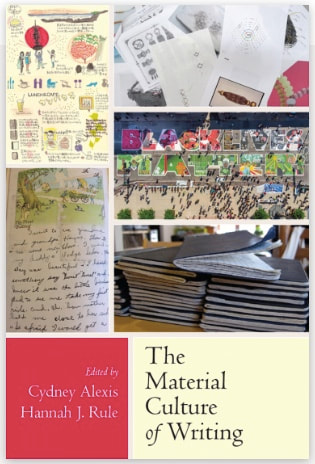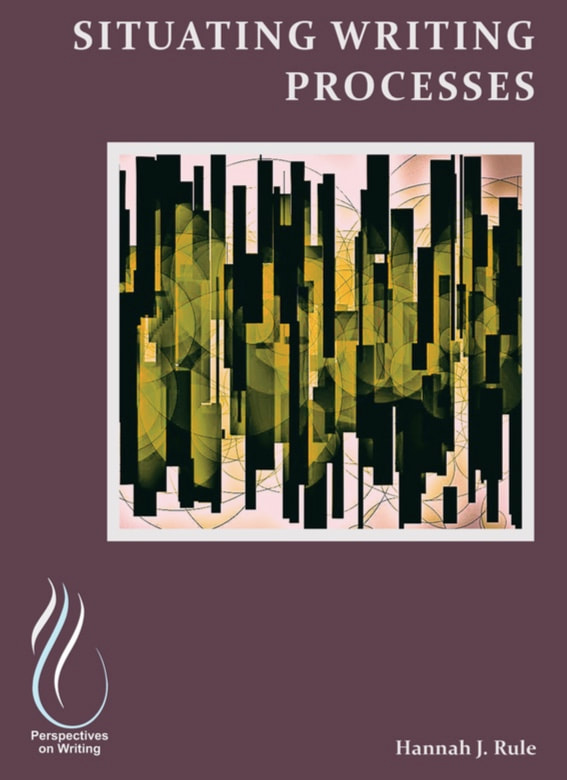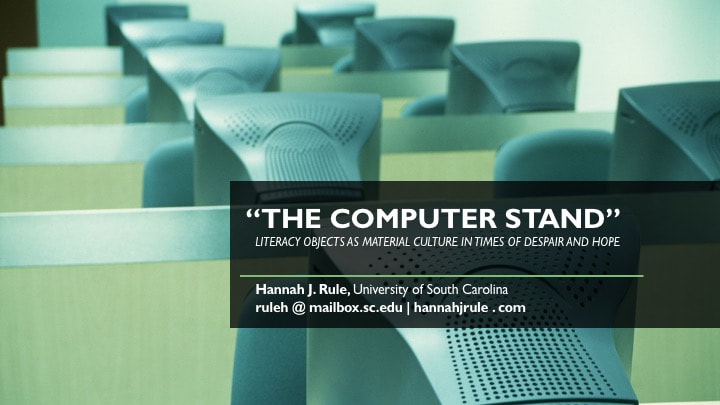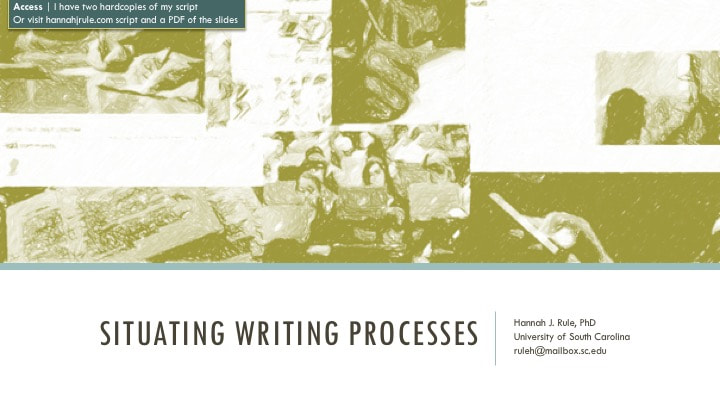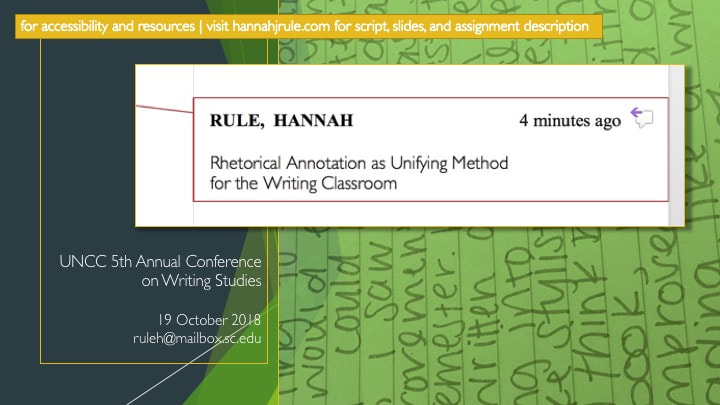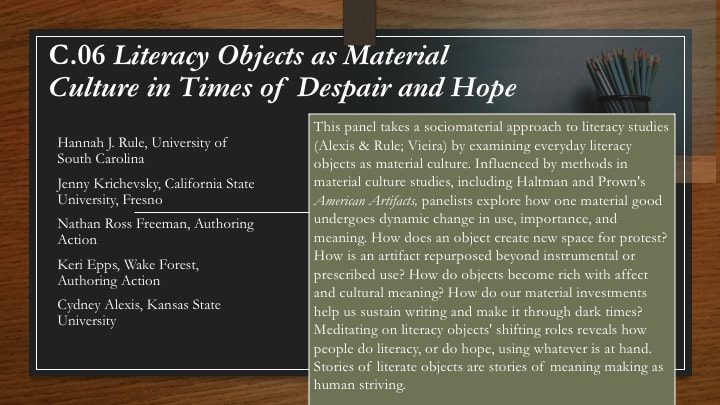|
My research situates in composition studies and writing pedagogies. I tend to ask after, and vigorously promote, writing and literate practices as full bodied - as material, sensational, haptic, visual, three-dimensional, differently embodied. Such an approach, which sees writing as a human technology ineluctably dependent on technologies, tools, and objects, is significant for the pursuit of access and difference. |
|
Revising Moves: Writing Stories of (Re)Making, with editing team Christina LaVecchia, Allison Carr, Laura Micciche and Jayne Stone, was published in 2024 by Utah State University Press.
Revising Moves focuses on the revising lives and work of professionals in writing studies. Each contributor narrates a story of revision featuring their scholarly, institutional, digital, collaborative, or mundane writing processes, revealing pictures of revision as "both a micro practice tracked by textual change and a macro phenomenon rooted in family life, institutional culture, identity commitments, and political and social upheaval." Revising Moves will change the way you think about a most familiar concept in our discipline. It will move you. Here is a little from the Editor's Introduction: "Because revision is so elusive, narration becomes essential for revealing what happens, particularly off the page. That said, chapters within do contain revision’s artifactual presence—marked up sentences from drafts, excerpts from reader reports, screen grabs, text messages. These instances act as cues that help writers find their way back to revising in situ and forward to revision stories. But narration doesn’t mean we’re getting the whole story. Indeed, contributors in this volume show us that revision stories are sometimes certain, obvious to their storyteller and follow a clear arc. Other revision stories struggle to be told at all, never quite coherently answering “what’s the story here?” Fittingly, then, embedded in the development of this volume is the failure of a totalizing, stable representation of revision (we think of cover art contributor Ian Golding on this point—revision is pesky, maybe even impossible to visually represent). The fact is that most often writers compose without preserving their process (maybe unless they’re being studied), and without retaining or even having access to what they did when they were doing it, in the moment or retrospectively. Revision and its traces often disappear. But attempts to capture revision—through storytelling, through retrospective recreation—prove illuminating. These attempts represent choices authors make to tell their revision stories in one way and not another and to create meaning from experiences that might otherwise have seemed too mundane to recount or too unconnected to be considered relevant. What results in this collection is a wide range of revision stories." Use code "CCCC24" to receive 40% at USUP. Code works until May 15th! ____________________________ The Material Culture of Writing, co-edited with Cydney Alexis - available from Utah State University Press This edited collection asks what happens when we center studies of writing on writing's objects. Taking a material culture studies approach and combining its methods with those of contributors' home disciplines - history, literature, professional writing, writing and literacy studies, museum studies - contributors to this volume each analyze writing objects: a street mural, moleskine notebooks, ink, heirlooms, a baby book, a design studio, a writing desk, conservators' files, hotel visitor albums, letters. Each chapter features methods and questions from contributors’ own disciplines while at the same time speaking to writing studies’ interest in writers, writing identity, and writing practice. ____________________________ Situating Writing Processes (WAC Clearinghouse/UP Colorado, 2019/2020) is about the histories and potentials of teaching writing as a process. An excerpt from the Introduction captures some of what the book is up to: It is about seeing located writing processes unfold (and about the partialities of that looking). It is about the disciplinary histories and theoretical stories we have told about writing processes and how those stories’ assumptions leave their imprints on our classrooms today. It is about enacting processes in our teaching less as serial drafts alone and more as embodied doing in specific fluctuating spaces. It is about how we—writers and teachers of writing—picture writing processes and about the value of differentiating, emplacing, and particularizing those images. This book aims to discover, theorize, and teach with writing processes as physically situated, and thus, improvisational. (6) An open access version, published with the WAC Clearinghouse in the Perspectives on Writing Series and edited by Sue McLeod and Rich Rice, is available for download. The print version of Situating is available with University Press of Colorado. |
|
Select Blind Peer-Reviewed
|
"In Search of the Sentence"
Composition Studies, 50th Anniversary Issue, 50.1, Spring 2022, pp. 134-140 "Writing Groups as Feminist Practice" Peitho 22.3, with Janine Morris and Christina LaVecchia "Sensing the Sentence: An Embodied Simulation Approach to Rhetorical Grammar" Best of the Journals in Rhetoric and Composition 2018 Edited by Jordan Canzonetta, et al., Parlor Press, 2019 "Writing's Rooms." CCC, vol. 69, no. 3, February 2018, pp. 402-432. >> Listen to CCC Podcast episode about this essay, with Jonathan Alexander and Jens Lloyd . "Composing Environments: The Materiality of Reading and Writing" With Kelly Blewett and Janine Morris. CEA Critic, vol. 78, no. 1, March 2016, pp. 24-44. "The Difficulties of Thinking Through Freewriting" Composition Forum 27, Spring 2013 "A Future Without Thesis Statements" Composition and Rhetoric in Contentious Times Rachel McCabe and Jennifer Juszkiewicz, eds. USUP, 2023. "Process Not Progress (or, Not-Progress is Process): A Narrative Meditation." Beyond Productivity: Embodied, Situated, and (Un)Balanced Faculty Writing Processes Kim Hensley Owens and Derek Van Ittersum, eds. USUP, 2023 “Beyond Page Design: Writing as Embodied Multimodal Meaning.” Writing Changes: Alphabetic Text and Multimodal Composition Pegeen Reichert Powell. MLA Press, 2019. "Good Writers Must Know Grammatical Terminology." Bad Ideas about Writing. Cheryl E. Ball and Drew M. Loewe, eds. West Virginia Libraries Digital Publishing Institute, 2017, pp.150-154. "Rereading Romanticism, Rereading Expressivism: Revising Voice through Wordsworth's Prefaces." Critical Expressivism: Theory and Practice in the Composition Classroom. Roseanne Gatto and Tara Roeder, eds. Parlor Press/The WAC Clearinghouse, 2014, pp. 201-217. “A Review of Tate et. al. A Guide to Composition Pedagogies, 2nd Edition.” Journal of Teaching Writing, vol 30, no.1, 2015, pp. 103-110. "Doing Style: A Review of Holcomb and and Killingsworth's Performing Prose." Enculturation: A Journal of Rhetoric, Writing, and Culture, vol. 15, 2013. |
Select
|
Your browser does not support viewing this document. Click here to download the document.
Your browser does not support viewing this document. Click here to download the document.
|
Watson Conference 2018 | "Situating Writing Processes" Presentation Script PDF of PPT Slides UNCC Writing Program Conference 2018 | "Annotation as Unifying Method" Presentation Script Presentation Slides Handout: WN prompt and Rubric ATEG 2017 | "Sensing the Sentence: Embodied Simulation and 'Label-less Grammar" Working from the assumptions of embodied simulation, a theory of meaning in linguistics and cognitive science that suggests we simulate language in our mind's eye and in our bodies, I demonstrate sensory methods for grammar discovery and sentence-craft. |
|
"Situating Writing Process"
12th Biennial Thomas R. Watson Conference on Rhetoric and Composition, October 2018 "Annotation as Unifying Rhetorical Method in the Writing Classroom" UNCC University Writing Program Conference, October 2018 "Undoing Theory/Practice (and Two other Provocations)" Panel: Provocations 15 Years after Rhetoric and Composition as Intellectual Work With Laura Micciche, Melissa Pearson, and Raul Sanchez CCCC 2018, Kansas City "Annotation Practices and Student Success in Reading and Writing" (handout) Invited Presentation: SC Technical College System Faculty Institute, October 2017 "Annotation as Writing Practice." UNCC University Writing Program Conference, October 2017 "Coffee, Friendship, Writing: Graduate Student Writing Groups and the Question of Community." With Janine Morris and Christina LaVecchia. 11th Biannual Feminisms and Rhetorics, Dayton OH, October 2017 "Sensing the Sentence: Embodied Simulation and "Label-less Grammar" Assembly for the Teaching of English Grammar (ATEG), Central Michigan U, August 2017. "Composition as Improv" CCCC Portland, March 2017. "The Touch and Feel of Typing" CCCC Houston, April 2016. "The Case for Romping: Questioning the Rhetoric of Distraction in Composing Processes." UNC Charlotte University Writing Program Conference, October 2015 "Collaborative Rubrics: Having Students Discover and Define Criteria for Evaluation" USC/CTE 2015 Oktoberbest: A Symposium on Teaching, Columbia, SC. October 2015. CTE Faculty Workshop, March 25, 2016. "The Case for Romping: Questioning the Rhetoric of Distraction in Composing Processes" College English Association (CEA) Conference, Indianapolis, IN. March 2015. "Hands to Keyboard: In Search of the Sensorium of Typing" Computers and Writing, University of Wisconsin-Stout. May 2015. |
Multimodal and Design
|
|
With the support of the 2011 Pearson Emerging Pedagogies Research and Travel Grant, I composed this photo essay that explores embodied rhetorics and pedagogies at CCCC Atlanta to explore how the conference experience is embodied. Interspersed are summaries of conference presentations that addressed embodiment in different ways.
|


